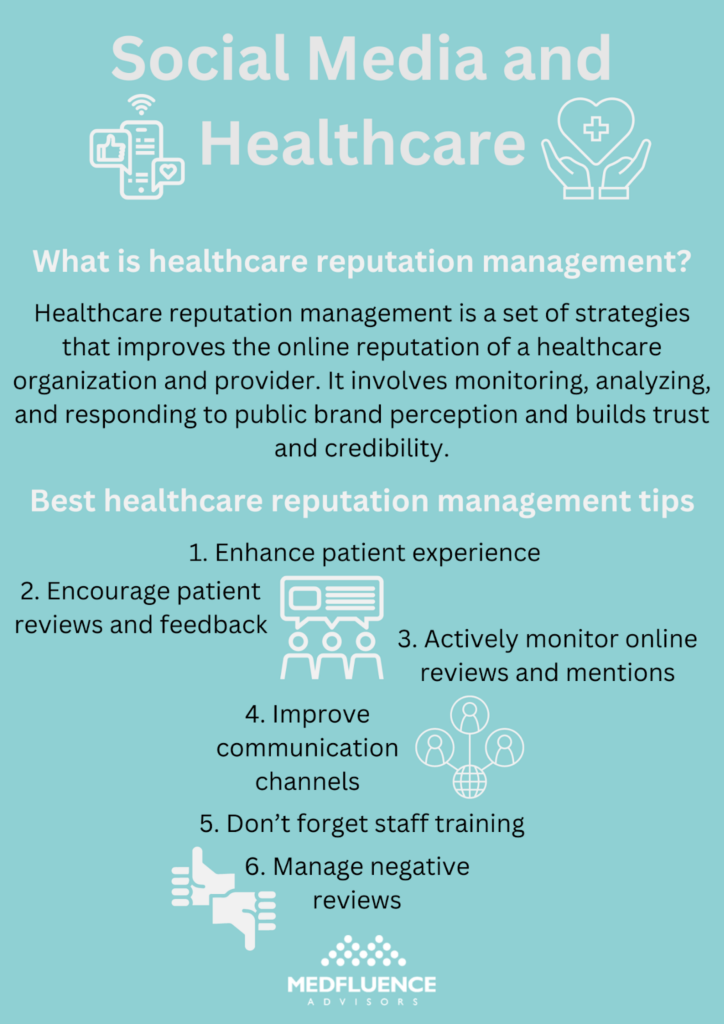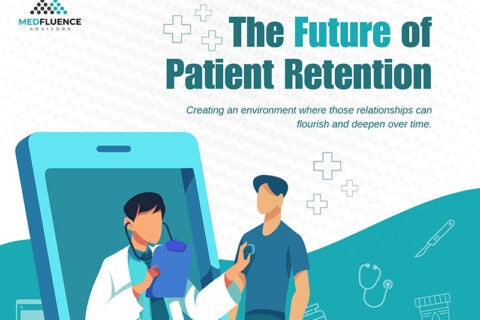The Impact of Social Media in Healthcare: How It Affects Patient Choices and Practice Reputation
Social media has made a huge impact on all aspects of society. Businesses have witnessed the power social media and the internet hold in their business’s success or failure and whether or not they can make sales to keep their operations afloat.
In today’s increasingly online and digital world, audiences and potential leads search for anything and everything on social media before taking action. They will check out a business organization on social media, look up its facilities and the services it offers, and even see what previous customers had to say about their experience.
All these can affect the audience’s decisions and whatever decisions they make going forward.
As such, we can safely say that social media has such a huge impact on many aspects of businesses and that fact remains true in the healthcare industry.
What Is Social Media?
As the digital world evolves and undergoes changes, social media often has a broader and hard-to-pinpoint definition. But generally, social media refers to internet-based platforms and tools that allow individuals and communities to gather together to communicate and share information, messages, photos, videos, and other forms of content.
Social media has allowed individuals to form online communities with like-minded people to freely share their information.
Social media serves a variety of purposes for many individuals. It can be a way to socialize with family and friends, publish blogs where they share their opinions on various matters, share media like photos and videos, provide knowledge and information, and even network with professionals in various fields.
What constitutes social media?
According to this 2021 study, social media can be categorized into 6 types:
- Social networks (Facebook, X, LinkedIn, Weibo)
- Media-sharing networks (Instagram, YouTube, TikTok)
- Discussion forums (Reddit, Quora)
- Content curation networks (Pinterest, Flipboard)
- Consumer review networks (Google Business, Yelp)
- Blogging and publishing networks (WordPress, Tumblr)
Does Social Media Affect the Healthcare Industry?
In this ever-digital world, audiences use various forms of social media to look up information on healthcare professionals, services, and locations. With the abundance of information social media currently holds, this doesn’t come as a surprise in any way.
Social media affects our lives in all aspects, and healthcare is not an exception.

To further understand how social media affects the healthcare industry, let’s discuss it in terms of benefits and drawbacks:
Benefits of social media in healthcare
- Social media is a gold mine of information for patient education
With the wildfire spread of social media use across various audiences, individuals have quick access to a treasure trove of information about various healthcare topics and concerns.
From patients sharing information and their own experiences dealing with the same symptoms to healthcare professionals using social media as a tool to share general healthcare information, social media has proven itself an undeniable force in information-sharing.
Because millions of users are on various social media platforms, it can be an effective avenue to educate the public on various healthcare topics. Whether it’s about new healthcare technologies, tips on staying healthy through allergy seasons, or disease outbreak news, social media can serve multiple purposes. - Social media builds patient-doctor relationships and promotes real-time communication and patient engagement
Because almost everyone – if not everyone – is constantly online, social media provides an effective strategy for healthcare organizations and practices to reach their target audiences. This facilitates relationship-building between healthcare professionals and patients to bridge the gap.Additionally, this makes it a great way to communicate with your audience – past and present patients. Communication is crucial for any business, and healthcare is no exception. Constant and consistent communication with patients makes them feel involved in their health so they’re constantly engaged and interested with your organization.Going back to number one, social media is an effective tool to let the public know about disease outbreaks and how they can protect themselves. - Social media as a marketing tool
Social media marketing is an effective tool to get your business in front of the right audiences, often at a low cost. By putting efforts towards social media marketing, businesses can increase their online visibility and brand reputation.Partnered with the right marketing messaging and tactics, your medical practice can expect an increase in the number of patients coming in and more revenue in the long run. - Social media and user reviews
One thing healthcare organizations must know is that modern patients flock to social media to gauge the performance of healthcare organizations and providers. Potential leads would want to know about other patient’s experiences with them.In a digital world where anyone can freely post about their experiences with an organization’s treatment, services, and overall facility, anyone equally has free access to these opinions and reviews. This can have a huge influence on their decisions.
Drawbacks of social media in healthcare
- Social media and misinformation
While social media is often seen and used as a research tool, healthcare professionals and the audience can never be too complacent with the quality of information it holds. Social media misinformation happens quite too often so everyone should be careful in what information they believe.While the people behind this false or inaccurate information might not intentionally spread it, your health is still at stake so audiences must know to do further research to try and confirm what they see online. - Social media and the dangers of self-diagnosis
Self-diagnosis is when individuals identify and diagnose medical conditions that affect them. This can be done through internet research or comparing other patient’s experiences with your own.When patients self-diagnose and convince themselves of its accuracy, they will forgo approaching health professionals for a proper consultation and diagnosis. They may start on the wrong treatments and this makes self-diagnosis dangerous. - Social media and patient privacy concerns
The healthcare industry handles tons of sensitive patient and health information. With the rampant use of social media in the industry by patients, audiences, healthcare professionals, and organizations, there is increasing concern about information security and privacy.Healthcare providers must give top priority to patient privacy. Social security numbers, sensitive health information, and other confidential data must be carefully protected, as even accidental disclosures will not be tolerated.Healthcare professionals must be careful not to share names and specific and identifiable details when talking about illnesses to educate their audience.There must be proper training for healthcare providers and other organization employees to teach them the proper way to handle this kind of information and avoid compliance violations.
Social Media and Patient Decisions
Through the years, social media has proven its huge impact on patient health decisions.
Many potential leads flock to social media first to check on what previous patients have to say about certain healthcare organizations and healthcare providers. This greatly influences their decisions in proceeding with booking an appointment or not.

Today’s modern patients pay very close attention to negative reviews and this has a huge influence on their decisions. Seeing the negative reviews on healthcare organizations and practitioners, may turn patients away from your practice and choose a different healthcare provider altogether.
Social Media and Practice Reputation
Today’s day and age is more digital than ever. According to this RepuGen 2024 survey, 73% of patients look up online reviews during the process of selecting a healthcare provider for their needs.
In an age where information is abundant and anyone can freely express their opinions online, online reviews have become a huge influence on how audiences will perceive healthcare organizations.
As such, medical practice reputation has become an undeniable force of nature for many medical practices. It directly affects patient decisions and will directly affect business revenue and growth.
And for any business, no matter the industry, the only way is up.
What Is Healthcare Reputation Management?
Having a strong online presence is vital for healthcare organizations and providers. This builds brand awareness and will bring your organization in front of the right audience. However, having an online presence is separate from having a good online reputation.
People may be aware of your brand but for the wrong reasons. This is why you need both online brand awareness and a good online brand reputation. This is where reputation management comes into play.
Healthcare reputation management is a set of strategies and tactics with the goal of improving the online reputation of a healthcare organization or provider. It involves monitoring, analyzing, and responding to public brand perception.
By managing the online reputation of healthcare organizations, it builds trust and credibility. And patients are more likely to book appointments with healthcare providers they deem trustworthy.
Healthcare practices, businesses, and organizations need reputation management to boost patient trust, foster growth, and enhance the quality of services.
Why Is Online Healthcare Reputation Management Important?
Online reputation management is vital for many businesses, no matter what the scale of operation is. Here are all the benefits your organization can enjoy when you make online healthcare reputation management one of your priorities:
- Online reviews make a huge impact
According to a survey, 73% of patients look up and consider online reviews when selecting a healthcare provider for their needs. In the same survey, nearly half of the respondents are influenced by the experience described by other patients.Additionally, when potential leads look up online reviews, they are more likely to book an appointment with a healthcare provider with more positive reviews and a higher overall star rating than an organization with more negative reviews and a lower overall star rating. - Build patient trust and confidence
A positive online reputation makes an organization look credible and this gives your patients confidence and a reason to trust in your care. Reputation management strategies will help you shape this positive online reputation. - Increase referrals
Digital and online is the new word-of-mouth and building a solid and positive online presence will increase your referrals.While traditional word-of-mouth and referrals from friends and family still dominate, what people online have to say about healthcare providers has a lot of weight on patient decisions. As such, healthcare providers need to monitor and manage what’s being said about them. - Business and revenue growth
When organizations have a positive reputation online, they are more likely to attract new patients. When more patients come to their clinics for services, it increases revenue, and business growth is to be expected in the long run. - Gain competitive advantage
The healthcare industry is competitive. When your organization implements effective online reputation management strategies, you gain a competitive edge that helps your business stand out.
Healthcare Reputation Management: The Best Tips and Practices
If you’re ready to take your business to the next level, here are the best practices for managing your online healthcare reputation:
- Enhance patient experience
Because you are a healthcare organization, patients should still be at the center of your operations. Focus on enhancing patient experiences by prioritizing their needs and preferences. Patient reviews and feedback will tell you what you’ve done right and what areas you can improve on. This will further enhance your services. - Encourage patient reviews and feedback
Take a proactive approach to online reviews. Not all patients who come in and out of your clinic will voluntarily leave online reviews and feedback. Encourage satisfied patients to leave online reviews on any of your business listings and social media platforms.You can take this a step further by developing a comprehensive patient feedback system. This can be in the form of patient surveys, feedback forms, and questionnaires. - Actively monitor online reviews and mentions
Part of managing your online reputation is keeping track of the online reviews patients leave and tracking mentions of your organization online. You must stay in the loop of what people are saying about your organization and practice.Respond and address them professionally and use this information to improve your service further. - Improve communication channels
Take advantage of business websites, social media sites, and business listing and review sites, and use all these platforms to improve your communication channels.Publish informative content, respond to patient feedback, and professionally address negative reviews and concerns. Additionally, make sure your patients and potential leads have multiple ways to get in touch with your organization regarding any concerns.These will boost your reputation and encourage your audience to trust you more. - Don’t forget staff training
Your staff will directly reflect on patient experiences. Train your staff to provide excellent customer service that prioritizes respect and empathy.Because everyone is on social media right now and is freely sharing any type of content online, it would benefit from training your staff on social media etiquette regarding their work and the patient cases they work with. Make a guideline on what information they cannot publicly post. This will reduce the likelihood of regulation violations. - Manage negative reviews
In online reputation management, it’s worth noting that you shouldn’t focus only on positive reviews. Never ignore positive reviews. Instead, professionally deal with them.First, you need to confirm whether the negative review is from an actual patient or not. If the latter, you can request the platform to have it taken down.If you have confirmed that the review is from an actual patient, respond professionally. Apologize for their negative experience and offer solutions and compromises for the inconvenience this has caused. Do it in a way that expresses empathy.

Social Media and Its Influence on Your Practice
Social media is an increasing and constant presence in many aspects of society. This remains to be true in the healthcare industry.
In an age where various audiences flock to social media for patient reviews and opinions, this has a huge impact on patient decisions. What other patients have to say about your organization and practice will make or break your chances of attracting and maintaining new patients.
Because of this, online healthcare reputation management has been a vital part of healthcare. A positive online reputation fosters business growth and increases revenue, in the long run, to support your business and help you provide more quality services.


